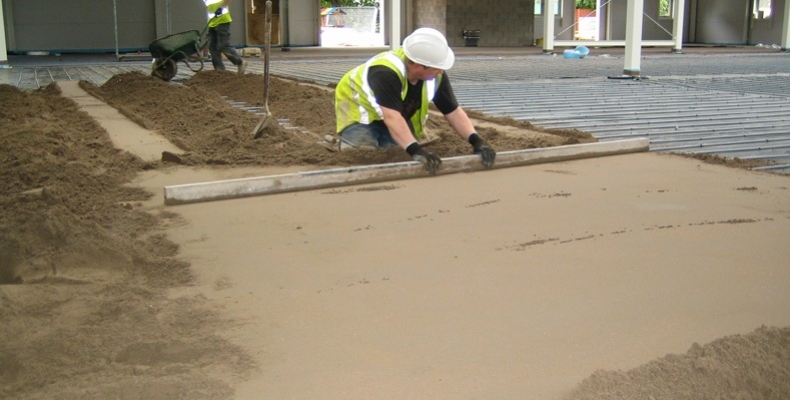Are your floors not level?
Uneven floors pose a serious risk of slips, trips, stumbles and falls – especially for those with limited mobility – and they can become unsightly.
Typically applied in a thin layer, opting to have your floor screeded can eliminate any potential bumps or irregularities in the subfloor – ensuring a smooth finish that’s safe and comfortable to walk on.
Although there are various types available, including liquid screeds (also known as anhydrite or free-flowing screeds), JCW uses only the best sand and cement floor screeds.
But what are the advantages of using this type of screed and how do you know which products best suit your project?
Read on to find out.
What can sand and cement floor screed be used for?
Traditional sand and cement floor screeds, like JCW’s, have been the go-to choice of the construction industry for more than 50 years.
From domestic to large-scale commercial applications – new builds or renovations – our sand and cement screed can be used for projects of all sizes.
Depending on your needs, special fibres and/or mesh can be added to the cementitious mixture to add strength and durability or reduce cracks and shrinkage.
What types of traditional floor screed are on offer?
At JCW, we provide the following screeding products:
With polypropylene fibres added for extra strength and to reduce cracking caused by shrinkage, this traditional screed is perfect for use in warehouses and various other industrial settings. It ensures a sturdy surface for heavy machinery and equipment.
Mixed with additives to achieve a minimum pressure resistance of 30Nmm², our higher-strength floor screed can protect subfloors from the impact of constant use and heavy foot traffic. When used as a topping over lighter screeds, it also offers a long-lasting solution.
Containing additives that help to reduce drying times, final floor coverings can be laid sooner with our fast-drying traditional screed. Ideal for projects with tight deadlines, it ensures no compromise to the functionality, longevity or durability of your screeded floor.
What are the benefits of using sand and cement screed?
Though sand and cement floor screed is one of the more old-fashioned products on the market these days, it can bring a number of advantages for your project.
These include:
- Versatility – sand and cement screed can be used on suspended or in-situ concrete floors – either as a topping to light aggregate screeds or as part of a floating floor to enhance acoustic or thermal performance. Though this type of screed can be smoothed to prepare your subfloor for a final flooring layer, it can also be left as the final finished surface.
- Durability – made up of 1 part cement to 3-5 parts sharp sand, traditional screeds are incredibly durable and hardwearing. They work perfectly in heavy-load applications and can last for many years to come.
- Energy efficiency – traditional screeds, as such, can be used to encase underfloor heating pipes. This helps to distribute heat evenly throughout the room – preventing any ghastly hot or cold spots while saving you money on your energy bills.
- Affordability – when compared with other types of screed, sand and cement floor screed is cheaper to produce – mostly because it’s made up of a combination of sharp sand, cement and water. Ready-mixed, our screeds can be trowelled into place by our experts – helping to minimise labour costs.
Ready to order sand and cement screed for your project?
Here at JCW, we regularly work with contractors, developers, self-builders and construction teams throughout the UK – providing only the best quality floor screeds for their projects.
We’d love to do the same for you, too!
If you have your room measurements to hand and know exactly which type of screed you need, be sure to get in touch and we’ll provide a fair yet competitive quote for our floor screeding services.
Alternatively, if you’d prefer to receive a more accurate price for your project, we can arrange a site survey – sending one of our screeding experts to visit your property and measure up and assess the job in full.
To arrange this, simply give us a call on 01204 387 029 or email your queries to estimating@jcwgroup.co.uk, and we’ll get back to you as soon as possible.


